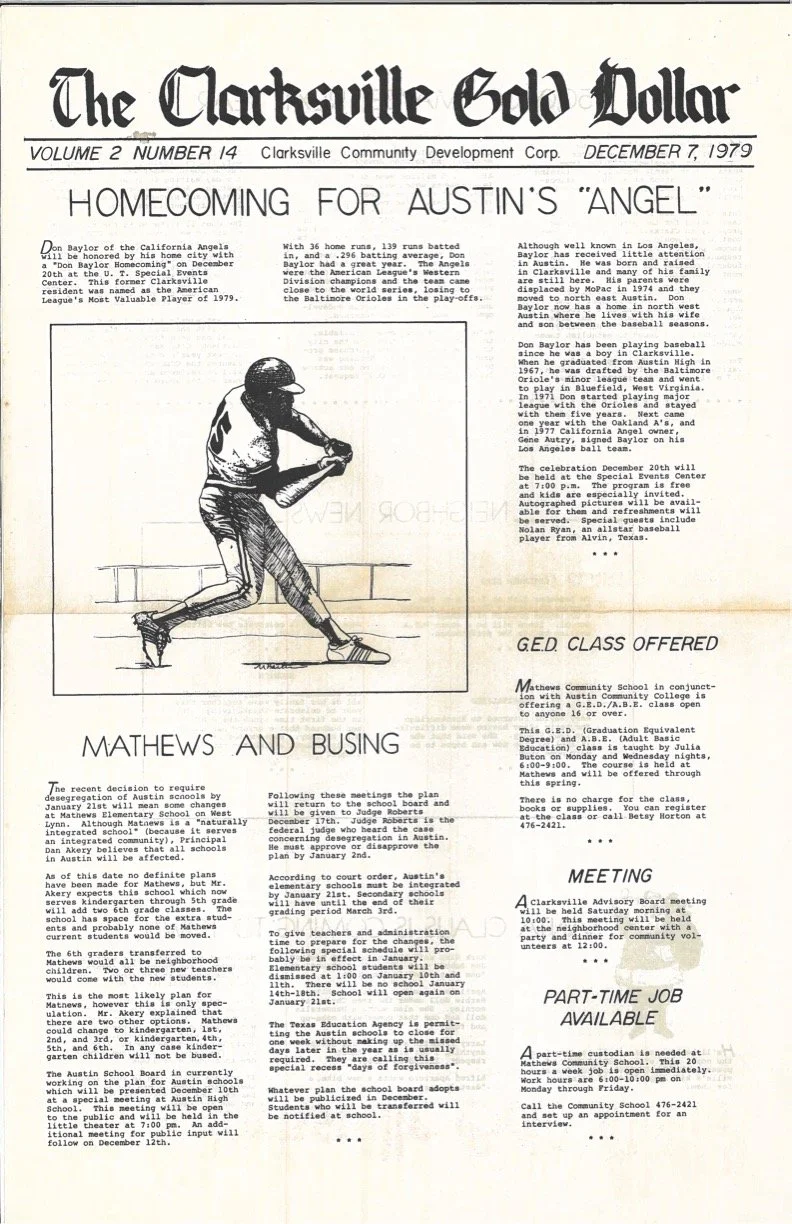February is Black History Month. In Celebration, We Profile Don Baylor
Don Baylor was a professional baseball player, batting coach and manager and probably the most famous person to be born and raised in Clarksville. His father was a porter for the Missouri Pacific Railroad and his mother was a school cook and cafeteria supervisor. The family attended Sweet Home Missionary Baptist Church and Baylor was a deacon there as an adult.
Clarksville was a poor place when Baylor was growing up, with unpaved streets, sewage in backyards, problems with flooding, and homes in need of repair; however, the neighborhood had a strong sense of community and Baylor was raised in a loving family. When he was growing up, his father provided him with wise advice about how to deal with the prejudice he would inevitably experience telling Baylor to always remember who he was and always try to be the best he could be. This advice helped Baylor succeed in baseball and in life.
Baylor and two other boys from Clarksville helped integrate O. Henry Junior School as 7th graders. O. Henry served mostly affluent neighborhoods that were worlds away from Clarksville. To help prepare for moving into a mostly white world, Baylor began a paper route so he could purchase a nice pair of jeans to wear to school. Despite the jeans, Baylor experienced a lot of prejudice from white students as well as his teachers. Looking back during a Fox Sports interview, Baylor commented, “You were walking into an all-white school. The teachers were just as tough as maybe the students were. Kids are going to be kids. Kids in the seventh grade are going to call you names. Call you the ‘N’ word. See how far they could push you. I was going to take on anybody’s challenge, so I had to calm down.” One day however, despite the admonitions of his mother to not get in any fights at school, Baylor chased a student into the school auditorium and fought with him in front of other students after that student shouted at him” “Why don’t you n*****s go back to the other side of town, go to school there!” Although Baylor was sent to the Principal’s office and got into trouble when he returned home, he remembered that neither he nor the other two Black students were ever called that name again.
Later, Baylor attended Austin High and became the first Black man to participate in athletics there. Although other Black students pressured him not to play baseball for the school because they viewed it as a “white Man’s sport,” Baylor played the game anyway. Talented and charismatic, he was named captain of the mostly white team in his senior year, was also a star player on Austin High’s football team, was chosen to be sergeant-at-arms for his senior class, was a good student, and made many lifelong white friends. Looking back on his experience at Austin High Baylor said, "I like to think I laid the groundwork for the generations that followed."
Aware of how well Baylor had handled himself at Austin High, Darrell Royal, UT Austin’s football coach at the time, offered him a football scholarship. If Baylor had accepted the offer, he would have been UT’s first Black football player. However, Baylor wanted to play baseball in college, not just football, and Royal wanted him to focus exclusively on football. Therefore, Baylor decided to turn down Royal’s office and to pursue a professional career in baseball instead. In 1967, the Baltimore Orioles drafted him at age 17. The signing took place at the Texas Capitol and Baylor received a $7,500 signing bonus.
Baylor began his career in the minor league playing for the Bluefield Orioles, which was part of the Appalachian League. During his first season, Baylor won the League’s batting title and was also recognized as Rookie of the Year.
Once he made his way into the major league, Baylor played for 19 seasons and was known for his speed and power hitting. During his major league career, he played primarily for the Baltimore Orioles and the California Angels, but Baylor also played for the Oakland Athletics, the New York Yankees, the Minnesota Twins and the Boston Red Sox. He helped the Minnesota Twins win the World Series in 1987 and also played in the 1986 World Series for the Red Sox and with the California Angels in the 1988 World Series.
As a player, Baylor was recognized as a charismatic leader and someone with integrity, which meant that he was often tapped to play leadership roles for the teams he played for. During his career, he was named an All-Star, won the American League’s Most Valuable Player award as well as three Silver Slugger Awards and the Roberto Clemente Award.
And, for those of you who like baseball stats, when Baylor retired as a player, his record included 285 stolen bases, 2,135 hits, 338 home runs and 1,276 runs batted in.
After he stopped playing baseball, Baylor managed the Colorado Rockies and the Chicago Cubs. During his career as a manager, Baylor was named NL Manager of the Year in 1995 and was inducted into the Angels Hall of Fame.
Baylor was inducted into the Los Angeles Angels Hall of Fame, the Texas Sports Hall of Fame, the International League Hall of Fame, and the Colorado Sports Hall of Fame in 2013.
Baylor died in 2017 after a 14-year struggle with multiple myeloma. He is buried in the Texas State Cemetery, which is reserved for Texans who have made great contributions to Texas.
The article below appeared in the Clarksville Gold Dollar newsletter prior to the City celebrating Baylor’s accomplishments by hosting a Don Baylor Homecoming party at U.T.’s Special Events Center. Also, Congress Avenue was renamed Don Baylor Avenue for the day.

